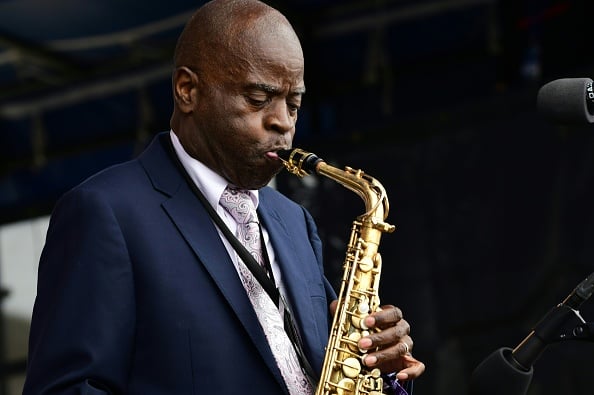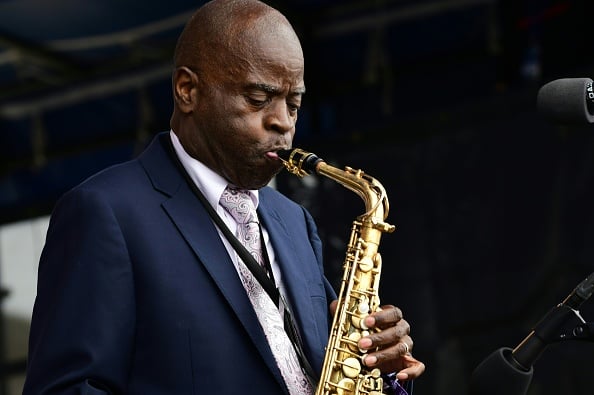What is Maceo Parker’s Net Worth?
Maceo Parker is an American funk and soul jazz saxophonist who has a net worth of $800 thousand. Best known for his long association with James Brown, Parker played a central role in shaping the tightly percussive, rhythm-forward style that became synonymous with Brown’s groundbreaking work. His sharp, punchy saxophone lines served as a bridge between jazz improvisation and funk’s raw, dance-driven power.
Over multiple decades, Parker became more than a sideman. He evolved into a commanding performer in his own right, leading bands, recording solo albums, and collaborating with artists across genres, including George Clinton, Prince, Ray Charles, Ani DiFranco, Dave Matthews Band, Keith Richards, and Red Hot Chili Peppers. His tone, phrasing, and ability to build drama through repetition made him one of the most recognizable horn players in modern music. Through constant touring and a charismatic stage presence, Parker built a devoted international following and established himself as a generational talent whose influence stretches across funk, soul, hip hop, and jazz.
Early Life
Maceo Parker was born in Kinston, North Carolina, into a musical family that included his brothers Melvin and Kellis, both of whom would later play alongside him. As a child, he was exposed to gospel, jazz, and rhythm and blues, and he learned piano and brass instruments before settling on the saxophone as his preferred voice. His early musical training came from a combination of formal instruction and constant exposure to live music through his family, church, and local community events. Parker studied music in college and performed with his brothers in local bands before a life-changing opportunity arrived in the early 1960s.
James Brown and the Birth of Funk
In 1964 Parker and his brother Melvin were invited to join James Brown’s band, a move that shifted the trajectory of his career and positioned him at the center of one of popular music’s most pivotal revolutions. With Brown, Parker became part of a rhythmic transformation that emphasized groove, repetition, and syncopation. His saxophone riffs and solos became calling cards of the Brown sound, heard on classic recordings like “Papa’s Got a Brand New Bag,” “I Got You (I Feel Good),” “Cold Sweat,” and “Sex Machine.”
Parker’s tight, rhythmic phrasing helped turn the horn section into a form of percussion, reshaping how funk and R&B would be arranged for decades. Throughout his years with Brown, he became a trusted musical anchor, often stepping forward for extended solos and occasionally taking over bandleading duties when Brown was offstage.

Getty Images
Parliament-Funkadelic and Solo Career
After leaving Brown’s band in the early 1970s, Parker joined George Clinton’s Parliament-Funkadelic collective. There he helped fuel the group’s electrifying stage shows and psychedelic funk sound. His work with P-Funk added to his reputation as one of the genre’s most versatile horn players, able to shift between tight rhythmic lines and expansive improvisational solos.
In the 1980s and 1990s Parker shifted focus to his own work, fronting bands and releasing solo albums that showcased his blend of jazz, soul, and funk. Albums such as “Life on Planet Groove” and “Roots Revisited” highlighted his ability to command the stage and demonstrated that he was as comfortable leading a band as he was adding color to someone else’s ensemble. His touring schedule remained remarkably active, and his live shows became a staple of jazz and funk festivals around the world.
Collaborations and Legacy
Parker’s career is notable not only for its longevity but also for the range of artists who sought him out. He played in Prince’s band for extended periods, collaborated with Ray Charles, and appeared on recordings with Ani DiFranco, Dave Matthews Band, Jane’s Addiction, Bootsy Collins, and De La Soul. His horn lines have been sampled by numerous hip hop producers, cementing his influence with new generations of listeners.
Maceo Parker is widely seen as one of the architects of funk and one of the most important saxophonists of the past century. His sound, built on equal parts discipline and explosive energy, remains a foundational element of modern American music.
All net worths are calculated using data drawn from public sources. When provided, we also incorporate private tips and feedback received from the celebrities or their representatives. While we work diligently to ensure that our numbers are as accurate as possible, unless otherwise indicated they are only estimates. We welcome all corrections and feedback using the button below.









